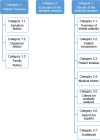Evaluation of a clinical decision support system for rare diseases: a qualitative study
- PMID: 33602191
- PMCID: PMC7890997
- DOI: 10.1186/s12911-021-01435-8
Evaluation of a clinical decision support system for rare diseases: a qualitative study
Abstract
Background: Rare Diseases (RDs) are difficult to diagnose. Clinical Decision Support Systems (CDSS) could support the diagnosis for RDs. The Medical Informatics in Research and Medicine (MIRACUM) consortium developed a CDSS for RDs based on distributed clinical data from eight German university hospitals. To support the diagnosis for difficult patient cases, the CDSS uses data from the different hospitals to perform a patient similarity analysis to obtain an indication of a diagnosis. To optimize our CDSS, we conducted a qualitative study to investigate usability and functionality of our designed CDSS.
Methods: We performed a Thinking Aloud Test (TA-Test) with RDs experts working in Rare Diseases Centers (RDCs) at MIRACUM locations which are specialized in diagnosis and treatment of RDs. An instruction sheet with tasks was prepared that the participants should perform with the CDSS during the study. The TA-Test was recorded on audio and video, whereas the resulting transcripts were analysed with a qualitative content analysis, as a ruled-guided fixed procedure to analyse text-based data. Furthermore, a questionnaire was handed out at the end of the study including the System Usability Scale (SUS).
Results: A total of eight experts from eight MIRACUM locations with an established RDC were included in the study. Results indicate that more detailed information about patients, such as descriptive attributes or findings, can help the system perform better. The system was rated positively in terms of functionality, such as functions that enable the user to obtain an overview of similar patients or medical history of a patient. However, there is a lack of transparency in the results of the CDSS patient similarity analysis. The study participants often stated that the system should present the user with an overview of exact symptoms, diagnosis, and other characteristics that define two patients as similar. In the usability section, the CDSS received a score of 73.21 points, which is ranked as good usability.
Conclusions: This qualitative study investigated the usability and functionality of a CDSS of RDs. Despite positive feedback about functionality of system, the CDSS still requires some revisions and improvement in transparency of the patient similarity analysis.
Keywords: Clinical decision support systems; Computer-assisted diagnosis; Rare diseases; Usability.
Conflict of interest statement
The authors declare that they have no competing interests.
Figures
References
-
- World Health Organization. Priority diseases and reasons for inclusion. 2013. https://www.who.int/medicines/areas/priority_medicines/Ch6_19Rare.pdf. Accessed 2 Dec 2020.
-
- Genetic Alliance UK. What is a rare disease. 2018. https://www.raredisease.org.uk/what-is-a-rare-disease. Accessed 2 Dec 2020.
Publication types
MeSH terms
LinkOut - more resources
Full Text Sources
Other Literature Sources


